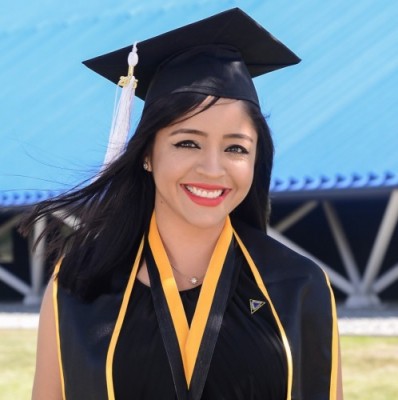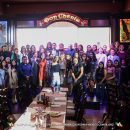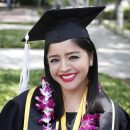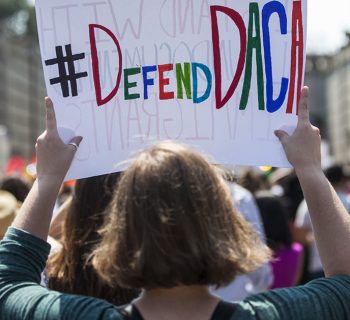Long Beach, May 16,2016
http://web.csulb.edu/newsroom/class-of-2016-spotlight-sandra-lopez
Sandra Lopez would like to be President of the United States someday, but as an undocumented immigrant born in Guadalajara, Mexico, she knows that’s impossible—at least today.
“I’m thinking I should run for president or something,” said the CSULB psychology major from Lakewood, who came to the U.S. at the age of 12. “I know I can’t right now, but I have high hopes. Maybe we can change that law.”
For now, the soon-to-be graduate is most keen on raising awareness of issues facing undocumented immigrants—all undocumented immigrants, not just those from her native Mexico.
“I want to help educate people about the reality of what’s going on,” said Lopez. “I think it’s really important to really start talking about it, so something can be done. I’m sharing my story and putting information out there because I see how little things can change people’s lives. What I want the most, is to make a change in this world for students who want to go far, but money or citizenship status are not allowing it.”
She’s helped get the word out in a variety of ways, particularly over the past year. She joined the Associated Students Inc. as the Secretary for AB540 and Undocumented Students. Lopez also worked in the office of Rep. Alan Lowenthal as one of four interns who created a special roundtable event recently called “DREAMers and U.S. Citizens Exiled in Mexico and Central America” to which they invited government officials and organizations.
“A lot of immigrant parents have U.S.-born children. Because the parents are being deported these U.S. citizens (the children) are exiled back to Mexico with them,” said Lopez. “For most of them their Spanish is not good, so when they get to Mexico they are literally in limbo. They cannot start school. At the roundtable, we wanted to provide some information and some enlightenment of what’s going on with these children in order to start a conversation about them. Those are U.S. citizens whose constitutional rights are being violated and they are not getting any healthcare or education.”
This past spring, she headed up an on-campus event called “A Day in the Life of An Undocumented Student,” at which individuals shared their story on what it’s like to be undocumented. Individuals from Argentina, the Philippines, El Salvador, Mexico, and others, participated.
“We had an open microphone where people could go up and tell their story,” said Lopez. “People think it’s easy to come out and say, ‘I’m undocumented. I was not born here. I do not have paperwork,’ but it’s not. Often there’s the backlash that ‘Mexicans are criminals and the undocumented are taking our jobs’ so people are afraid to come out and say they are undocumented, so it was so great to hear people be so open. That’s what we need.”
In high school, Lopez applied to a number of universities with her 4.0 grade point average and was accepted at each. In fact, she was in the top 4 percent of her graduating class in California, but financially couldn’t attend any university because she wasn’t able to secure any scholarships, simply because they all required U.S. citizenship status, which she does not have. Instead, she worked two, sometimes three jobs while attending Long Beach City College and eventually came to CSULB, a place she felt she belonged.
“I feel like this is my home. It is so amazing to see what the university is doing to support us, undocumented students,” she said. “Creating awareness about the DREAM Success Center on campus and undocumented students was one of my tasks. I’m a DREAMer. I’m not lurking in the shadows, but I kind of used to be.
“When I graduated from high school if someone asked if you were undocumented, it was like they were saying, ‘I’m going to come and take you,’” added Lopez. “That’s the fear that I had—fear of deportation, fear of being separated from my family, so I wouldn’t say anything. In order to create awareness, I have to put myself out there. I tell everyone I am undocumented and this is my story. By me doing that I have found out there are many others like me who have similar stories, so I am not alone.”
Lopez dreams of a future where she, and others like her, can travel the world freely, something that for now is virtually impossible as an undocumented immigrant.
She was excited when a new policy called DACA (Deferred Action for Childhood Arrivals) came about in 2012. DACA is an American immigration policy that allowed certain undocumented immigrants to receive a renewable two-year work permit and exemption from deportation. Following soon was Advance Parole authorization for DACA recipients, which allowed undocumented immigrants the opportunity to travel outside of the United States, with the guarantee of legal re-entry into the U.S. However, Lopez read the “small print” and felt the guarantee of return was not so certain.
“I was so excited,” she said. “I thought, ‘Now I can go to Europe,’ but when I read about possibly not being able to come back I decided I wasn’t doing it. I couldn’t take that chance.”
She had a change of heart and took the chance when Chicano and Latino Studies’ Professor Armando Vazquez-Ramos told her they have to take advantage of this opportunity for DREAMers to be able to study in Mexico and be able to see their families. As part of the department’s California-Mexico Project, he had led smaller study groups to Mexico before and Lopez was part of the third which included 30 students from 18 institutions throughout California. The program was based in Mexico City, but allowed students eight days solely to reconnect with family members. Lopez flew to Guadalajara to see family members, including her father and grandmother.
“I was able to go back after 13 years and see my grandmother,” she said. “The program was 24 days, the first eight during which students could go see family. When you get back, everything is school. It’s very intensive. It’s like 12 hours a day, but it includes not just opening a book and looking at pyramids. You actually go to the pyramids and get to experience your culture. Other topics learned in school are education, history and we practiced our Spanish. A lot of the students left Mexico when they were extremely young, so they hardly remember anything. A lot of them didn’t even know how to pay with pesos.”
As for her future, Lopez is reverting back to her high school dream and thinking of applying for law school, which at that time she kind of gave up on because to do so required citizenship.
“Back then, if you were undocumented you couldn’t become a lawyer, even if you could pay your way,” she said. “In 2014 there was a law passed where you can become a lawyer even if you are undocumented. I’m thinking about it now.”







